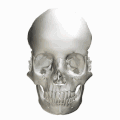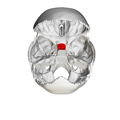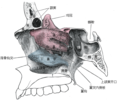土耳其鞍
外觀
(重新導向自腦垂腺窩)
| 蝶鞍 | |
|---|---|
 Human skull seen from side (parietal bones and temporal bones have been removed). Sella turcica shown in red. | |
 蝶鞍及腦下垂體 | |
| 標識字符 | |
| 拉丁文 | Sella turcica |
| MeSH | D012658 |
| TA98 | A02.1.05.006 |
| TA2 | 589 |
| FMA | FMA:54709 |
| 格雷氏 | p.147 |
| 《骨骼解剖學術語》 [在維基數據上編輯] | |
土耳其鞍(Sella turcica)意即土耳其椅,又名蝶鞍,為蝶骨上一鞍型構造,存在於人、黑猩猩、猩猩及大猩猩等人科動物的顱骨上。為頭影測量的標誌位置。
土耳其鞍位於顱中窩正中部、蝶骨體上部;形似馬鞍狀;包括垂體窩、鞍結節、中床突、交叉前溝、視神經管、前床突、鞍背和後床突等結構。
土耳其鞍是顱內骨結構的解剖學名稱,指的是蝶骨在顱中窩中間部分高起,形如馬鞍的骨結構。蝶鞍中央凹陷叫垂體窩,容納腦垂體。正常情況下,蝶鞍與腦垂體之間緊密相貼,幾乎沒有空隙。當各種病理因素導致蝶鞍變形(鞍隔缺損)、擴大或腦垂體萎縮變小,使蝶鞍中央凹陷與腦垂體之間的間隙擴大,形成「空泡」樣改變,在顱骨X片、腦室造影、CT或腦部核磁共振檢查時可發現明顯的密度降低形如「空泡」的影像,稱為蝶鞍空泡(empty sella)。
構造
[編輯]土耳其鞍的位置位於腦垂腺窩中。腦垂腺窩是固定腦垂腺的位置,位於蝶骨的凹坑中。而位於腦垂體窩前的則是鞍結
功能
[編輯]蝶鞍構成固定腦下垂體的空間。
辭源
[編輯]土耳其鞍的原文「Sella turcica」是拉丁文、「sella」是「座椅」的意思,而「turcica」則是土耳其的的意思。
參見
[編輯]本條目使用了部分解剖術語。
附加圖像
[編輯]-
人類顱骨顳面照(顳骨已移除),紅色部分為土耳其鞍。
-
蝶骨俯視照,紅色部分為土耳其鞍。
-
Human skull seen from top (parietal bones have been removed). Sella turcica shown in red.
-
Sphenoid bone. Upper surface. (There is no label for "Sella turcica", but "Tuberculum sellae" and "Fossa hypophyseos" are visible near center.)
-
Medial wall of left orbit. (Sella turcica labeled in upper right.)
-
Lateral wall of nasal cavity, showing ethmoid bone in position.
-
Base of skull - sella turcica
-
Base of skull - dorsum sellae
-
Base of skull - tuberculum sellae and hypophyseal fossa
參考文獻
[編輯]- Marieb, Elaine Nicpon. Human Anatomy & Physiology 6th. Pearson Education. 2004: 209. ISBN 0-8053-5462-X.
外部連結
[編輯]- Image at Indiana.edu (頁面存檔備份,存於互聯網檔案館)
- eMedicine Dictionary上的Sella+turcica










